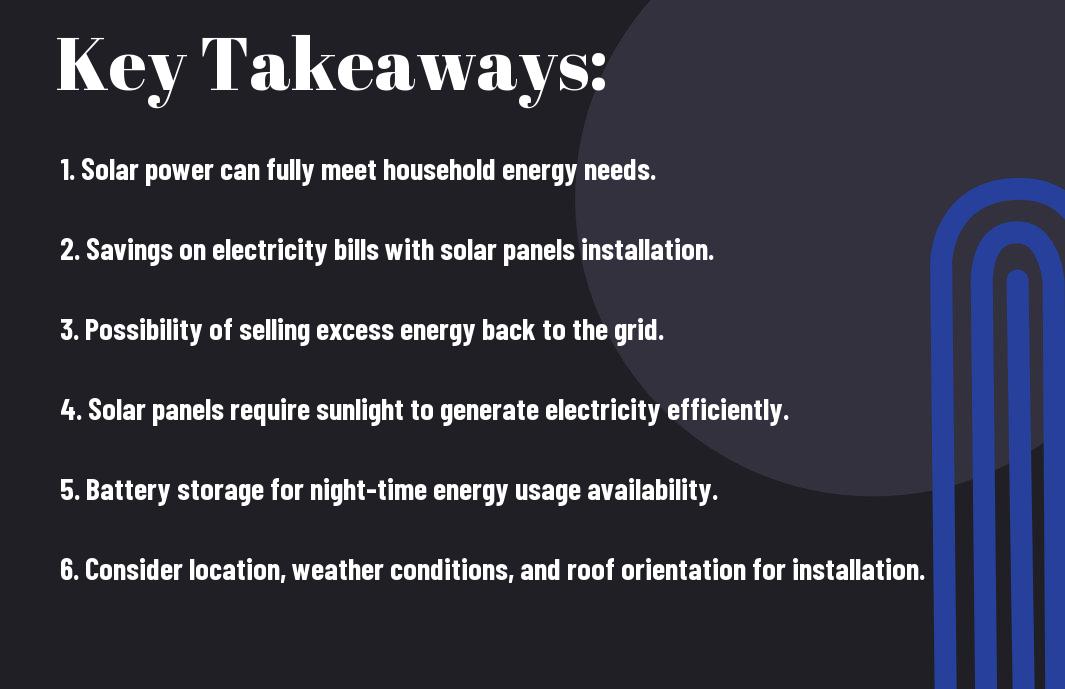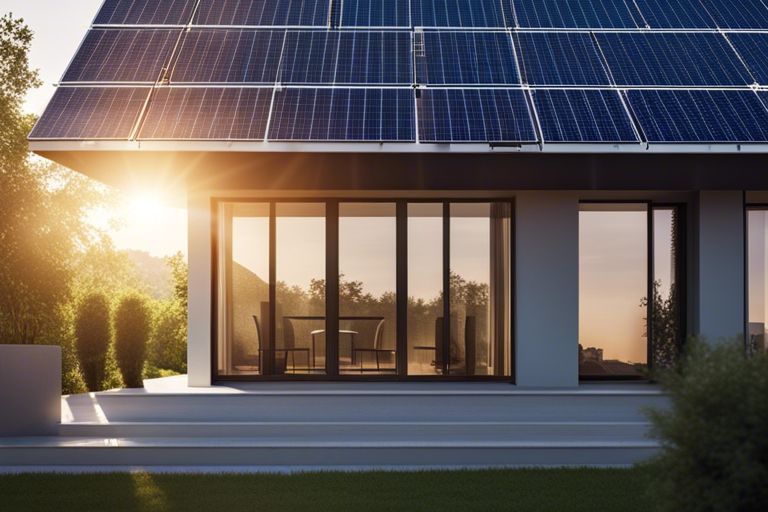It’s time to address the age-old question: Can solar really power a house? You might have heard different opinions on this, but let’s look into the facts and figures to see if transitioning to solar energy for your household needs is a viable option. Are you curious to know if you can run your house off solar panels without connecting them to the power company? Find out here!
Key Takeaways:
- Solar panels can power a house: With the right system and configuration, solar panels can provide enough energy to power a home.
- Energy storage is important: Installing a battery storage system can help store excess solar energy for use during low production periods.
- Government incentives can help: Many governments offer incentives and tax credits for installing solar panels, making the transition more affordable.
- It depends on your energy consumption: The size of your solar system should be based on your household’s energy needs to ensure adequate power supply.
- Consult a professional: It is recommended to consult with a solar energy professional to assess your home’s suitability for solar power and to design a custom system for your needs.
The Promise of Solar Power
Renewable Energy Sources
A key aspect of solar power is that it comes from a renewable energy source – the sun. Unlike finite resources such as coal or natural gas, the sun will continue to shine for billions of years, making it a reliable source of energy for the long term. Harnessing this abundant energy through solar panels on your roof can provide you with a sustainable and eco-friendly way to power your home.
Environmental Benefits
By choosing solar power for your home, you can significantly reduce your carbon footprint and lessen your impact on the environment. Solar energy is a clean source of power that produces no greenhouse gas emissions or air pollutants during operation. This means that not only are you saving money on your electricity bills, but you are also contributing to a cleaner and healthier planet for future generations.
Transitioning to solar power can also help reduce our dependence on fossil fuels, which are major contributors to climate change. By generating your electricity from the sun, you are taking a proactive step towards a more sustainable and environmentally friendly energy future.
How Solar Power Works
There’s a fascinating process behind how solar power works in powering your house. It all starts with photovoltaic cells, commonly known as solar cells, which are the building blocks of solar panels that convert sunlight into electricity.
Photovoltaic Cells
To harness solar energy, photovoltaic cells are made from semiconducting materials like silicon. When sunlight hits these cells, it excites the electrons, creating an electrical current. This direct current (DC) is then converted into alternate current (AC) electricity, which is what powers your home.
Inverters and Converters
Photovoltaic systems also include inverters and converters, which play a crucial role in transforming the DC electricity generated by the solar panels into AC electricity that can be used to power your household appliances. Inverters ensure that the electricity produced is compatible with your home’s electrical system, making it usable for your daily needs.
Understanding the function of inverters and converters is necessary for maximizing the efficiency of your solar power system. By converting the DC electricity into AC electricity, these components ensure that your household can use the solar energy effectively, reducing your reliance on the grid.
Grid Connection and Net Metering
One of the key benefits of solar power is its ability to be connected to the grid, allowing you to both consume and sell electricity. Through a process called net metering, any excess electricity generated by your solar panels can be sent back to the grid, earning you credits that can offset your future electricity bills.
With a grid connection and net metering in place, you can tap into the reliability of the grid when your solar panels aren’t producing enough electricity, ensuring a constant power supply for your household. This dynamic relationship between your solar power system and the grid offers a sustainable and cost-effective solution for powering your home.
Can Solar Power Meet Household Energy Demands?
Average Energy Consumption
After deciding to power your house with solar energy, one of the first considerations is your average energy consumption. This figure is important as it will determine the size and configuration of your solar power system. To calculate your average energy consumption, you can review your previous utility bills or use online tools to estimate your daily energy usage.
Peak Sun Hours and Energy Output
Solar power systems rely on sunlight to generate electricity, and the amount of energy produced is directly correlated with the number of peak sun hours your location receives. Any reputable solar provider will consider this factor when designing your system to ensure it meets your energy needs. Peak sun hours refer to the number of hours in a day when the sunlight is strong enough to be efficiently converted into electricity.
For instance, if you receive five peak sun hours per day, a 5kW solar power system could potentially produce 25kWh of energy daily, assuming optimal conditions. However, it’s important to remember that factors like shading, weather conditions, and system efficiency can influence the actual energy output.
System Sizing and Configuration
Solar power systems are sized based on your energy consumption patterns and the peak sun hours in your area. Consumption patterns include the timing of high energy usage, such as running appliances, heating or cooling your home, and other energy-intensive activities. By analyzing your consumption habits, a solar provider can recommend the ideal system size and configuration to meet your needs.
System sizing also involves determining the number of solar panels, inverters, and batteries required to ensure a reliable and efficient power supply for your household. Additionally, the orientation and tilt angle of the solar panels play a crucial role in maximizing energy production throughout the year.
Overcoming Energy Storage Challenges
Despite the intermittent nature of solar energy, advancements in battery technology have significantly improved energy storage capabilities.
Battery Technology Advancements
Energy storage solutions like lithium-ion batteries have made it possible to store excess energy generated during the day for use at night or on cloudy days. These batteries are becoming more efficient, affordable, and longer-lasting, making them a practical solution for residential solar power systems.
Grid-Tied Systems and Backup Power
Advancements in grid-tied systems allow you to stay connected to the grid while also having a backup power source. This means that when your solar panels don’t produce enough energy, you can seamlessly switch to grid power without any interruptions.
Overcoming energy storage challenges is critical for maximizing the benefits of solar power for your home. By investing in battery technology and grid-tied systems, you can ensure a reliable and continuous power supply that meets your household’s energy needs.
Energy Efficiency and Load Management
Energy efficiency measures such as using energy-saving appliances, improving insulation, and practicing load management can help you reduce your overall energy consumption. By implementing these strategies, you can lower your electricity bills and make the most of the energy generated by your solar panels.
For instance, scheduling high-energy tasks like laundry or dishwashing during peak sunlight hours when your solar panels are producing the most energy can help you maximize self-consumption and reduce reliance on the grid.
Cost and Financial Incentives
For Can Solar Panels Power an Entire House?, it’s important to consider the costs and financial incentives associated with solar power. Let’s break down the key aspects to help you understand the financial implications of powering your house with solar energy.
Upfront Costs and ROI
One of the major considerations when switching to solar power is the upfront costs. While the initial investment in solar panels and installation can be significant, the return on investment (ROI) over time can make it a financially smart decision. Factors like energy savings, potential increase in home value, and available incentives can contribute to the long-term financial benefits of going solar.
Government Incentives and Tax Credits
Credits
Government incentives and tax credits play a crucial role in making solar power more affordable for homeowners. You may be eligible for federal tax credits, rebates, or other incentives that can significantly reduce the overall cost of installing solar panels on your property. These financial perks are designed to encourage renewable energy adoption and can help you save money while reducing your carbon footprint.
Costs
Net Metering and Selling Excess Energy
Financial
The ability to benefit from net metering and selling excess energy back to the grid is another financial incentive of solar power. Net metering allows you to offset your electricity costs by selling surplus energy generated by your solar panels, providing you with additional savings on your utility bills. This two-way energy flow not only helps you save money but also promotes the efficient use of renewable energy sources.
The
Real-World Examples and Success Stories
Residential Solar Installations
Stories of homeowners successfully running their entire houses on solar power are becoming more common. If you’re wondering if it’s possible for you, check out Can I Run My Whole House on Solar Power? for insights on how solar can power your home. These success stories often highlight how a well-designed solar system tailored to your energy needs can not only power your appliances and devices but also generate surplus energy.
Community Solar Programs
To increase access to solar power, many communities offer shared solar programs where multiple households can benefit from a collectively owned solar installation. These programs allow you to subscribe to a portion of the solar energy produced without needing to install panels on your property. This can be a great option if you are unable to install solar panels on your roof due to space or ownership constraints.
With community solar, you can still enjoy the cost savings and eco-friendly benefits of solar power without the need for individual installations. Additionally, these programs often come with flexible subscription options, making it a convenient choice for those looking to support renewable energy.
Commercial and Industrial Applications
The adoption of solar power is not limited to residential properties. Many businesses and industries are also harnessing solar energy to meet their power needs efficiently. The scalability of solar systems allows commercial and industrial buildings to offset a significant portion of their electricity consumption with clean, renewable energy.
The cost savings and environmental advantages of solar power make it an attractive option for businesses looking to reduce their operational expenses and carbon footprint simultaneously. Whether you own a small shop or a large manufacturing facility, integrating solar panels into your energy mix can lead to long-term benefits for your business.
Final Words
Drawing together the information presented in this article, it is clear that solar power can indeed effectively power a house. By harnessing the abundant energy from the sun through solar panels, you can significantly reduce your reliance on traditional energy sources and even save money in the long run. With advancements in technology and decreasing costs, switching to solar power is becoming an increasingly viable and sustainable option for homeowners.
FAQ
Q: Can solar power really power a house?
A: Yes, solar power can effectively power a house. Solar panels can convert sunlight into electricity, which can then be used to power all the electrical devices and systems in a house.
Q: How much solar power is needed to run a typical house?
A: The amount of solar power needed to run a typical house will vary based on factors such as the size of the house, the energy consumption of the household, and the efficiency of the solar panels. On average, a household may need a solar panel system with a capacity of 3 to 8 kilowatts to meet its energy needs.
Q: Are there any benefits to using solar power for a house?
A: Yes, there are several benefits to using solar power for a house. Some of the key benefits include reduced electricity bills, lower carbon footprint, increased property value, energy independence, and potential tax incentives or rebates for installing solar panels.



